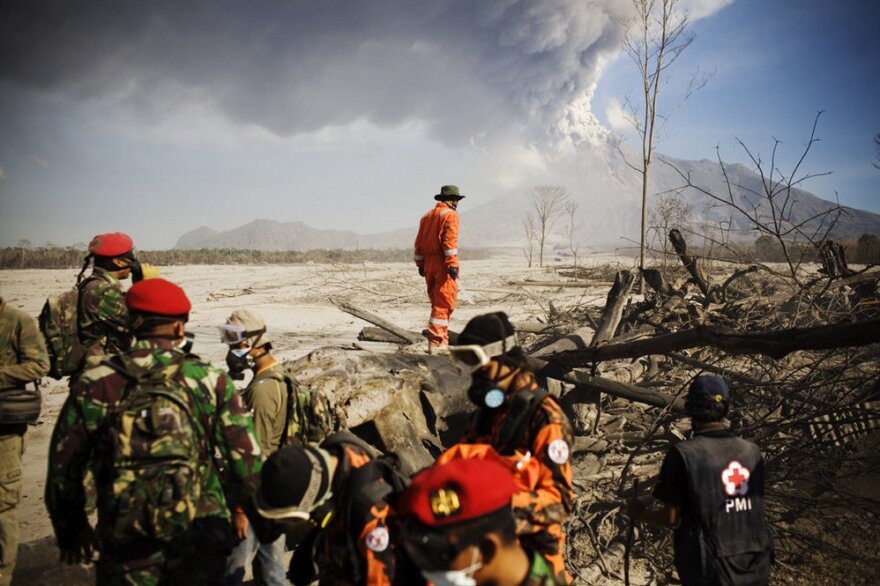After two weeks of volcanic eruptions, life for people living near Indonesia's Mount Merapi remains dangerous and difficult. The death toll from the eruptions has surpassed 200, and more than a quarter of a million people have evacuated their homes. While vulcanologists believe the eruption is dying down, they can't guarantee it won't flare up again.
On the south side of Merapi, Indonesian army commandos lead a search-and-rescue mission. In the distance, smoke and gray ash billow from Merapi's crater high into the sky. Heat shimmers up from the scorched earth. A burnt and decaying stench hangs in the air.
Commandos and rescue workers pick and shovel through an obliterated village. They place a few bones and blackened remains in body bags before heading back to base.
There, battalion commander Lt. Col. Iwan Setiawan reviews his ash-covered troops. The commandos, known as Kopassus, could use some good publicity. Until recently, they were blacklisted by the U.S. for human rights abuses.
Setiawan says that seven bodies were found on today's mission. They will be delivered to a nearby hospital. The village lay just four miles from the volcano, well within the 12-mile danger zone delineated by authorities. He adds that the rescue missions are mandated by the government and will continue until the government tells the commandos to stop.
Storms Of Ash, Hot Gas
The wind blows the ash from Mount Merapi westward, where it rains down from the sky. It crushes the vegetation, including the tropical fruit trees -- mangosteens, rambutans and snake fruit -- that farmers here grow.
In the village of Nglumut, farmer Maryoto, who uses just one name, is cutting broken branches from his snake fruit trees. Every chop of his sickle brings clouds of ash cascading down. The pruning will save the plants, but they will bear no fruit for two years. And yet, he explains, the eruption is a mixed blessing.
"When the volcano doesn't erupt, I have to use fertilizer to help the fruit grow," he says. "Now the ash fertilizes the soil. And I'll mine volcanic sand and sell it for making concrete. If all else fails, I'll ask for assistance from the government."
Local government employee Sabari has had worse luck. He's at the main state hospital in Yogyakarta city, recovering from second- and third-degree burns on his hands and feet. If he's lucky, they won't need to be amputated. He and his son survived an eruption. His wife did not. He remembers the eruption began in the middle of the night.
"I heard my nephew's children crying for help," he recalls. "I opened the door to let them in, and I got burned by the heat. I hid under a mattress. I waited while it rained for a while, and when I went out, I saw dead bodies."
Sabari's house is not far from a river. Superhot gases from eruptions usually follow the rivers as they flow down the mountain's side.
A Failure Of The Spirit World
Subandriyo is a government vulcanologist in Yogyakarta. He says Mount Merapi is Indonesia's youngest volcano, and this is its biggest eruption ever. He estimates it has disgorged around 4.6 billion cubic feet of rocks, sand, dust and gas.
Subandriyo and his team actually predicted Merapi's eruption, including which way the searing gases and rocks would flow.
"Our modeling was good, and the preparations for evacuation were good," he says, pointing to detailed maps. "The problem was with communication -- in other words, disseminating the information to the people."
Subandriyo believes a man named Marijan, the spiritual guardian of the mountain, is partly to blame. Subandriyo notified Marijan that an eruption was coming, but Marijan's contacts in the spirit world told him otherwise. Marijan was found burned to death in his home. Now the sultan of Yogyakarta must select a new guardian for Merapi.
Most residents near Merapi face hardship with a stoic composure. Mohammed Nur, a 52-year-old noodle peddler, sits with his wife and daughters at a soccer stadium where his whole village took refuge just before the eruption.
"I will always remember this eruption," he predicts. "I will tell my children and my grandchildren about it. I can accept what has happened to me, because after all, my home is only nine miles from the volcano."
As for Mount Merapi's guardian, Mohammed Nur says he only half-believes what the mystics say. But, he reasons, the guardians are still a part of Java's traditions, and so many people still listen to them.
Copyright 2022 NPR. To see more, visit https://www.npr.org. 9(MDAzMjM2NDYzMDEyMzc1Njk5NjAxNzY3OQ001))














